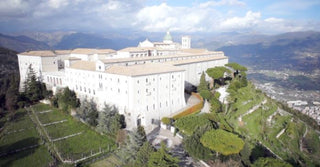Born into a Catholic feudal family, in Aquino (the modern-day Italian region of Lazio), a very young Thomas joined the ranks of the Monte Cassino abbey in 1230. After nine spiritually and culturally enriching years spent there, Thomas Aquinas was sent to the University of Naples, where eventually he became passionate about science and philosophy.

Monte Cassino Abbey
The cornerstone of his argument was that reason and faith correspond respectively to the ‘natural law’, which is visible to everyone, and the ‘eternal law’, only accessible to those you have faith. The works of Aristotle and of the Arabic philosopher Averroës had been central to Saint Thomas’ discovery of such duality. This teaching of his led his theories to be discredited alongside those of Averroës. This division survives to this day. His opponents claim that reason can only originate confusion within the realm of faith.

Thomas Aquinas Works
Saint Thomas Aquinas left us a rich selection of theological treatises. We've summed them up here in five essential bullet points:
Summa Contra Gentiles
This writing offers a set of reasonings aimed at convincing, hence converting the non-believers to Christianity. The main point is to showcase the virtues of faith.
Contra Errores Graecorum
From Latin, ‘Against the errors of the Greeks’. Written in 1263, this work attempts to clarify the misunderstandings that resulted in the conflict between the Eastern Orthodox Church and the Catholic Church.
Summa Theologica
In this well-known masterpiece, the Saint describes the ‘five ways’ theory that can be summed up as follows: God is simple; God is perfect; God is infinite; God is immutable; God is one.
Commentaries On Aristotle
As we mentioned above, Aristotle’s school of thought was central to Aquinas’ works. That’s why an important part of his writings consist of commentaries on the Greek philosopher’s theories, such as "On the Heavens and Earth".
On Kingship To The King Of Cyprus
Dedicated to the king of Cyprus, this work is about the matters of political leadership. Here he tackled questions such as the thin line that separates a king from a tyrant and the role of force in the government.
Related Articles:
St Anthony of Padua, the Patron we Pray for Lost Things→
St Francis Life in a Nutshell→









